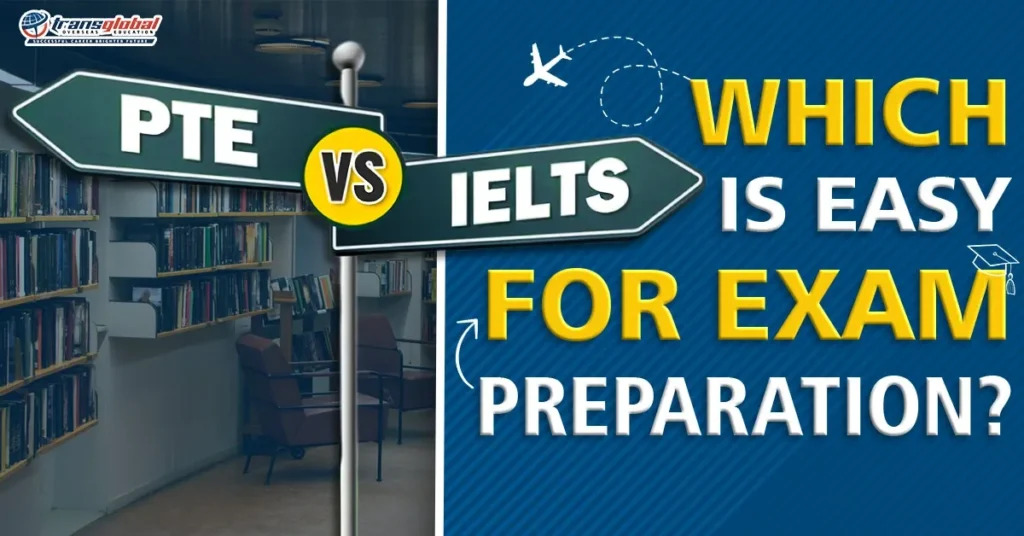Conquering an English language proficiency test is a crucial hurdle for many aspiring international students and immigrants. Both PTE (Pearson Test of English) and IELTS (International English Language Testing System) are widely accepted for these purposes. But for test-takers staring down practice materials and exam dates, a key question arises: Which exam is easier to prepare for?
The answer, unfortunately, isn't a straightforward one. Both PTE and IELTS assess the same core English skills: reading, listening, speaking, and writing. Neither is inherently "easier" in terms of the level of English required. However, the format, scoring system, and individual preferences can significantly impact your exam preparation experience.
Here's a breakdown of key factors to consider when choosing between PTE and IELTS for exam preparation ease:
Test Format:
- PTE: A completely computer-based test. Tasks are integrated, meaning all four skills might be tested within a single section. The format emphasizes fluency and spontaneity.
- IELTS: Offers both computer-delivered and paper-based options. The test is divided into four distinct modules (reading, listening, writing, speaking) taken consecutively. It allows for more traditional test-taking strategies.
Test Environment:
- PTE: You'll be interacting with a computer and microphone in a potentially shared testing center. This might feel impersonal or add pressure for some test-takers.
- IELTS: The speaking test involves interaction with a live examiner. This can be nerve-wracking for those with test anxiety, but also allows for human understanding of your accent or communication style.
Scoring System:
- PTE: Scored entirely by algorithms, aiming to remove human bias. Scores are available quickly, typically within 48 hours.
- IELTS: Uses a combination of human examiners and automated scoring. Results typically take 5-14 days.
Preparation Resources:
- PTE: Due to its computer-based nature, official PTE practice materials are largely digital. There are, however, numerous third-party resources available online and in bookstores.
- IELTS: Benefits from a longer history and wider range of established preparation materials, including both official and third-party resources. Many resources cater to the specific format and question types of the paper-based test.
Choosing the Right Test for You:
Consider these factors to determine which exam might be easier for you to prepare for:
- Comfort with Technology: If you're comfortable with computers and online tests, PTE's format might feel more intuitive.
- Test Anxiety: If you struggle with speaking in front of others, the computer-based speaking test in PTE could be less stressful.
- Learning Style: Do you prefer a structured format with distinct sections (IELTS) or a more integrated approach (PTE)?
- Accent Strength: If you have a strong non-native accent, the human examiner in IELTS might be better at understanding you compared to the AI scoring in PTE.
Making Exam Preparation Easier:
Regardless of which test you choose, here are some general tips to make exam preparation smoother:
- Start Early: Give yourself ample time to study and practice.
- Identify Your Weaknesses: Take practice tests to pinpoint areas needing improvement.
- Utilize Official Resources: Familiarize yourself with the test format and scoring criteria.
- Find a Study Partner: Partnering with someone preparing for the same test can boost motivation and offer practice opportunities.
- Immerse Yourself in English: Surround yourself with the language through movies, music, and reading.
- Join Course: You can join Transglobal Overseas’s PTE/ IELTS coaching in Delhi. They will help you from choosing which is best for you to achieve a high score.
Conclusion:
There's no single answer to which exam is easier to prepare for. PTE and IELTS cater to different preferences and learning styles. By understanding the key differences and your own strengths and weaknesses, you can make an informed decision and approach exam preparation with confidence. Remember, consistent practice and focusing on building strong English skills are crucial for success in either PTE or IELTS.
5 FAQs
Is there a significant difference in the difficulty level of PTE and IELTS?
No, both PTE and IELTS assess the same level of English proficiency. The difficulty lies more in the format and how well it suits your individual strengths and weaknesses.
Which test is accepted by more institutions?
Both PTE and IELTS are widely accepted for immigration and academic purposes. However, it's always best to check the specific requirements of the institution you're applying to.
How much time should I dedicate to preparing for PTE or IELTS?
The ideal study time varies depending on your current English level and the target score you aim for. Generally, a minimum of 3-4 months of dedicated preparation is recommended.
Are there any specific resources available for working professionals preparing for PTE or IELTS?
Yes, there are numerous online resources and evening classes designed for busy professionals. Look for materials that offer flexible study options and cater to shorter study windows.
Can I retake the PTE or IELTS exam if I'm not satisfied with my score?
Absolutely! You can retake either exam as many times as you need. However, factor in registration fees and allow enough time for improvement before retaking the test.





Comments